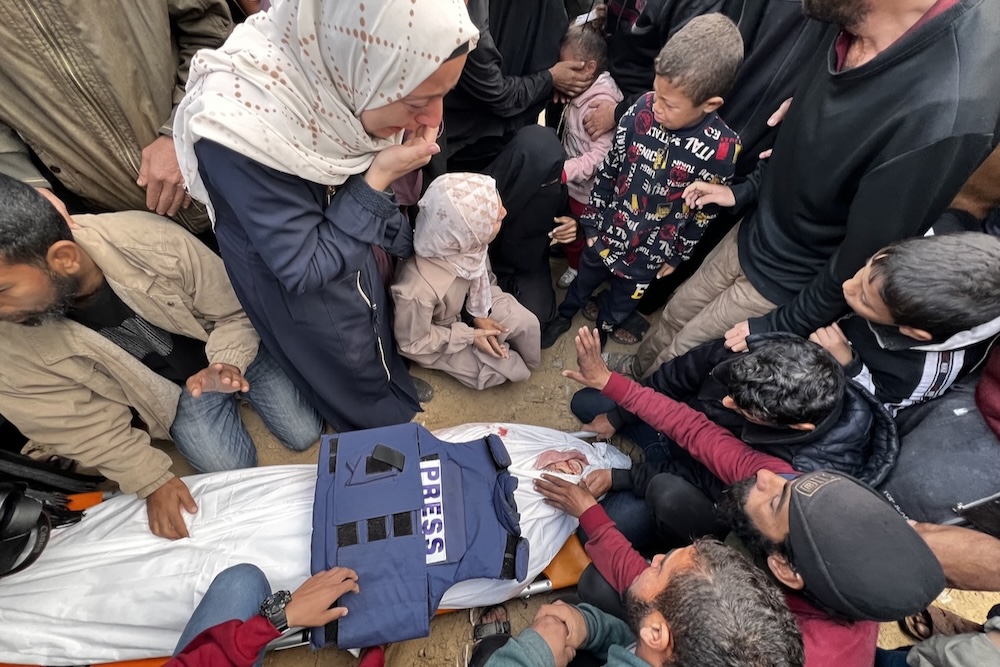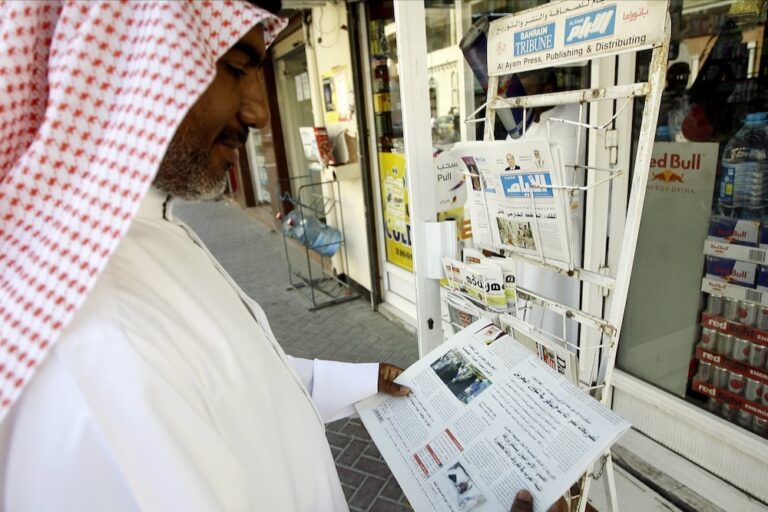January 2025 in MENA: A free expression and civic space round-up produced by IFEX's Regional Editor Naseem Tarawnah, based on IFEX member reports and news from the region.
A push for accountability in Gaza, bringing Bashar al-Assad to justice, growing online surveillance and privacy risks, transnational repression, and Tunisia tightens its grip on civic space.
Ceasefire pauses fighting, but not repression
The fragile ceasefire between Israel and Hamas in Gaza has provided only a temporary reprieve from the genocide that has unfolded over the past 15 months. Yet, the crisis is far from over – for journalists and media workers, who continue to face grave dangers.
Since October 2023, more than 61,700 Palestinians have been killed, including over 200 journalists and media workers, many of whom were deliberately targeted by Israeli forces – an act that rights groups have condemned as a war crime.
As the ceasefire neared, Israeli attacks on Palestinian journalists escalated, extinguishing voices that had borne witness to months of devastation.
Journalist Ahmed Al-Shayah was among six people killed when an airstrike struck a food distribution site in southern Gaza. Another journalist, Aqel Saleh, was killed in an Israeli airstrike on the Shati refugee camp. Ahlam Al Nafed, a journalist and photographer, was killed while walking to Al Shifa Hospital, marking the 28th woman journalist killed since the war began, according to the Coalition for Women in Journalism.
Earlier in the month, journalist Saed Abu Nahban was reportedly shot dead by an Israeli sniper as he was covering a military raid in Al-Jadeed Refugee Camp, while journalist Omar Al-Derawi was killed when an airstrike targeted his family home.
Even on the eve of the ceasefire’s announcement, journalist and activist Ahmad Abu Rous and his brother were killed when their vehicle was struck in the Nuseirat refugee camp. Just before the attack, Abu Rous had shared a video expressing hope that the ceasefire would soon take effect.
As demands for accountability continue to grow, the Committee to Protect Journalists (CPJ) has urged authorities to grant journalists and independent human rights experts unrestricted access to investigate these crimes. CPJ has also pressed EU officials ahead of a Foreign Affairs Council meeting to support independent investigations.
The Cairo Institute for Human Rights Studies (CIHRS), calling the ceasefire a crucial step against Israel’s genocidal campaign, emphasised that lifting Gaza’s blockade and ensuring full access to all affected areas are essential for any credible investigation into the scale of the atrocities.
Beyond Gaza, as Jewish settler attacks and Israeli military raids escalate in the occupied West Bank, Palestinian journalists face mounting violence from all sides. The Palestinian Center for Development and Media Freedoms (MADA) condemned the harassment and detention of journalists, including Mahmoud Matar and Jarrah Khalaf. Journalist Nagham Al-Zayt was also wounded by Israeli gunfire while covering a raid that restricted media access.
Syria’s accountability and press freedom challenges
A French investigative judge has issued a new arrest warrant against former Syrian president Bashar al-Assad for complicity in war crimes, ruling that he can no longer claim immunity as a former head of state. The warrant stems from a 2017 attack on Daraa, where over 2,000 civilians were killed in systematic strikes targeting schools, hospitals, and infrastructure.
The Syrian Center for Media and Freedom of Expression (SCM) played a pivotal role in building the case, joining the proceedings as a civil party and providing key evidence identifying the attack’s perpetrators and chain of command. This marks the second French warrant against Assad, following one issued in 2023 for chemical attacks on Eastern Ghouta.
“The ongoing impunity in Syria remains an obstacle to achieving stability and risks fueling cycles of revenge. Decisive steps are needed to close this chapter and pave the way for a national transitional justice process that ensures sustainable peace and a fairer future for all Syrians.”
— Mazen Darwish, SCM director
As the pendulum swings towards a new political reality, press freedom remains critical in Syria. Reporters Without Borders (RSF) called on the new authorities to release detained journalists, dismantle censorship and surveillance systems, and establish legal protections to ensure an independent and pluralistic media landscape.
In the midst of Syria’s fragile post-Assad reality, Social Media Exchange (SMEX) highlights the disquieting spread of disinformation – an erosion of truth that preys on an already polarised society, fueling sectarian tensions through recirculated content, impersonation campaigns, and targeted hate speech.
Online surveillance and privacy risks
Governments across MENA are tightening control over digital spaces, raising alarms about privacy and free expression. Digital rights groups warn of escalating online surveillance in Iraq, the United Arab Emirates (UAE), and the Kingdom of Saudi Arabia (KSA). Iraq’s Balgh platform continues to be used to monitor speech and curtail freedom of expression, leading to arrests and self-censorship, with women disproportionately targeted. Rights groups call for its immediate shutdown.
Meanwhile, SMEX warns that apps like Kwai, ToTok, Baaz, and Botim, promoted by the UAE and KSA, heighten surveillance and censorship risks by exploiting weak security and unchecked data collection in a region with minimal privacy protections.
The Civic Media Observatory’s report on Sudan highlights how the absence of clear data governance laws has left citizens vulnerable to digital rights abuses amid the ongoing conflict. From mass surveillance to AI-driven misinformation and targeted telecom shutdowns, the digital landscape there has become another battleground, deepening the crisis.
Silencing dissidents across borders
The extradition of Abdel-Rahman al-Qaradawi from Lebanon to the UAE has intensified concerns about transnational repression in the MENA region. The Turkish-Egyptian poet and outspoken critic of authoritarian regimes was arrested on extradition requests from both Egypt and the UAE. Despite widespread warnings from rights organisations, Lebanon proceeded with his transfer – underscoring a growing disregard for international law.
This case highlights the problematic role of the Arab Interior Ministers’ Council, which, lacking proper safeguards, facilitates politically motivated arrests among Arab League states. As a result, dissidents are being arbitrarily targeted, even in countries typically considered safe havens.
Similar cases further illustrate the trend. Ahmed Kamel, detained in Saudi Arabia and facing imminent extradition to Egypt on dubious charges, has prompted rights groups to write to the Trump administration, urging intervention.
Likewise, Iraq’s recent extradition of Kuwaiti blogger Salman Al-Khalidi – a UK-based political refugee – to Kuwait has raised serious concerns. According to the Gulf Centre for Human Rights (GCHR), Al-Khalidi’s extradition violates international refugee protections and exposes him to further persecution.
These cases underscore the urgent need for robust international safeguards to protect dissidents from cross-border repression.
Tunisia tightens the grip on its hard-won civic space
On 14 January, prominent human rights defender Sihem Bensedrine began a hunger strike while detained in Manouba prison, following her August 2024 arrest. Bensedrine’s detention, linked to her investigation of human rights violations under previous regimes, is widely viewed as retaliation for her activism.
This repression reflects a broader decline in Tunisia’s human rights landscape. Human Rights Watch’s 2024 report revealed a sharp increase in politically motivated arrests, including over 80 individuals detained before the October 2024 elections, many of whom were critics of President Kais Saied. CPJ reported that at least five journalists were imprisoned as of December 2024, the highest number since its tracking began in 1992.
Meanwhile, ARTICLE 19’s latest policy brief commends Tunisia’s progress in advancing digital access to information but warns that government control over digital platforms and media undermines these gains, threatening free expression.
Push for women’s voices in government in Lebanon
The country’s two-year leadership vacuum ended last month with the election of military commander Joseph Aoun as president. He pledged to uphold freedoms, strengthen judicial independence, and fight corruption, promising judicial reforms and public service improvements. However, his election is controversial, as Lebanon’s constitution bars sitting military commanders from the presidency.
Amid this political shift, the Lebanese Women’s Platform – a coalition of over 45 organisations – has called for greater women’s participation in the country’s government. Advocating for a gender quota and stronger representation in decision-making, the platform stresses that inclusive governance is essential for long-term stability.
In Brief
Bahrain: The Bahrain Center for Human Rights (BCHR) reports that the country’s education system is being used to suppress dissent, with discriminatory scholarship practices, targeting of educators, and a sectarian curriculum that marginalises minority voices.
In the wider GCC [Gulf Cooperation Council, a group of six countries in the Persian Gulf: Bahrain, Kuwait, Qatar, Oman, Saudi Arabia, and the United Arab Emirates], despite advances in women’s education, legal restrictions and guardianship laws still limit opportunities. Americans for Democracy & Human Rights in Bahrain (ADHRB) highlights that the lack of democratic institutions, an independent judiciary, and restrictions on freedom of association hinder women’s ability to advocate for their educational rights.
Jordan: Journalist Ahmed Hassan Al-Zoubi’s sentence for criticising the government’s response to a truck drivers’ strike was converted to community service. His case highlights the misuse of Jordan’s Cybercrime Law to suppress free expression. GCHR has called for the release of other prisoners of conscience facing similar charges, including journalists and political activists like Hiba Abu Taha, Ayman Sandouqa, Sufyan Khraisat, and Sabri Al-Masha’leh.
Sudan: Freelance journalist Yahya Hamad Fadlallah died on 13 January, one month after his arrest by the Sudanese Armed Forces. Fadlallah, reportedly tortured and falsely accused, passed away shortly after his release due to deteriorating health. CPJ is urging a transparent investigation into his death, which follows the December killing of journalist Hanan Adam and her brother.
New & Noteworthy
- 7amleh warns that Meta’s reliance on Community Notes and user reports could heighten censorship of Palestinian voices. IFEX members weigh in on the global implications – read more here.
- SMEX released a manifesto calling for reforms in Lebanon’s telecommunications sector to secure essential services and support free expression amid outdated regulations.
- A new GCHR report highlights both the unique risks and emerging opportunities for women human rights defenders, pointing to critical gaps in protection services.



